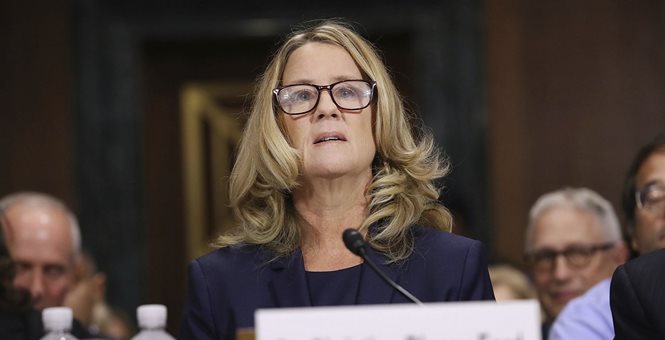Justice for Dr. Ford
by Nidra Poller

In a healthy democracy, one private unelected individual would not determine the future of the US Supreme Court. The appointment of a justice is a political decision that should be debated rationally and ultimately decided by an up down vote, reflecting the balance of political power. The current US president chose a candidate compatible with his politics.
But the normal process of appointing a new justice has been jolted out of reality and thrust into a virtual time machine.
At the eleventh hour, Dr. Christine Blasey Ford accuses Judge Brett Kavanaugh of sexual assault… in 1982…when she was 15 and he was 17. And suddenly the 21 members of the Senate Judiciary committee are sucked into a grotesque debate over a hypothetical incident that cannot possibly be retrieved for scrupulous investigation. No matter how hard they peer into the crystal ball of the past, they will never find their way to a home that has no address, on a day that exists on no calendar, in the presence of witnesses that were not there.
The question is not he-said-she-said. The question is the civic duty of a responsible citizen, male or female, tempted to come forth with an accusation that would inevitably destroy the reputation of the accused. Whether true or false, an accusation of sexual assault in the age of MeToo is sure to cause irreparable damage to the accused. No due process there!
Senators, commentators, and tens of millions of viewers are transfixed by the human drama focused on one woman, Dr. Ford, and one man, Judge Kavanaugh. If the woman in question is a victim, it follows that she cannot be guilty of abuse of power. If her tears and quavering lip are convincing, off with the judge’s head.
If her civic duty is to come forth today and innocently destroy his reputation, his life, and his career, what was the civic duty of a young girl in 1982 who narrowly escaped from a sexual assault that, in her words, has left her suffering from PTSD forever after?
We do not now and never will have enough information to judge the veracity of Dr. Ford’s account of an incident that allegedly occurred 36 years ago. Speculations on the details of an uncorroborated incident simply flesh it out and make it seem real. That’s the work of fiction.
As responsible citizens we should avoid the naïve reflex of entering the film and saving the damsel from distress. Our civic duty is to detach ourselves from the accuser and examine the principles underlying the accusation. Is it ethical for one individual to acquire such extraordinary power to influence the future of an entire nation simply by raising her victimhood to epic proportions?
Not so long ago, when a white woman accused a black man of sexual assault, which included a wink or a whistle, the man would be jailed or even lynched. This gave women a power of life and death over black men.
In our free world, where women are not subject to sharia law and will not be “honor killed” for denouncing a man, a young woman who is a victim of sexual assault might well assume the responsibility of telling someone—her parents, a doctor or other trusted adult, and girlfriends that might themselves be victims of the predator(s). Silence, in this case, could be considered dereliction of civic duty.
Is it, then, noble to denounce a man decades after the fact? With full knowledge of the consequences?